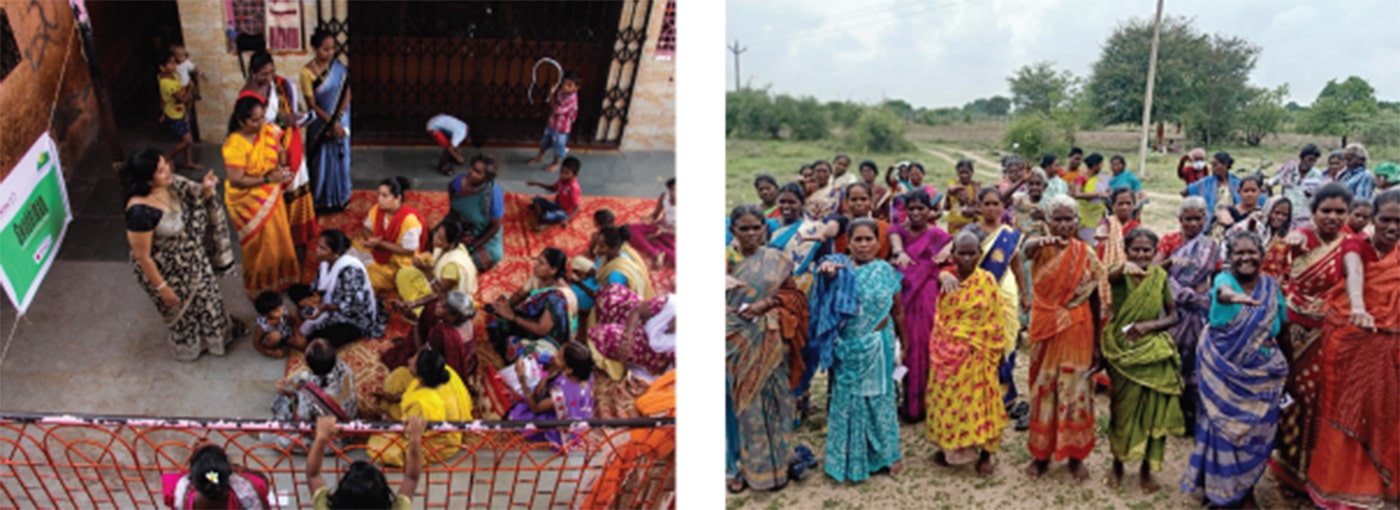November 2022

The International Labor Organization (ILO) estimates that rural women comprise one-quarter of the world’s population and are potential contributors to a country’s social and economic growth. But despite this, and the key roles that these women play in the economy, they are faced with constant inequalities and challenges that prevent open access to work opportunities, better livelihoods and an improved hygiene landscape.
Women hygiene and Covid-19 setbacks
According to the World Health Organization (WHO) only 16% women in India have access to sanitary napkins and proper sanitation facilities in their homes. It is estimated that 82% of females in India lack proper knowledge about a sanitary napkin, its uses and benefits. Even the well-educated urban women are also unaware of healthy hygiene practices during their periods. A poor menstrual hygiene cycle can pose major risks to the lives of women and put them at risk of developing other dangerous illnesses.Unfortunately, efforts to improve women hygiene took a huge step backwards due to the recent pandemic. The successive Covid-19 lockdowns brought a shortage in the number of sanitary pads in India. Most factories were shut and there was marginal production of goods in the country. The women survived on existing supplies and reserves. The rural and semi-urban areas were the worst hit and even cities got impacted due to the shortage.
Rural women and their hygiene
To empower rural women and raise the standards of personal feminine hygiene, the Government of India has come up with various initiatives– Swachh Bharat Mission (SBM) started in 2014 places great emphasis on the importance and need for improving existing sanitation facilities, as well as constructing the same where none exist. According to the NITI Aayog 2020 report, SBM has successfully achieved the target of making India open-defecation-free (ODF) by constructing over 109 million household and community toilets in 6,03,175 villages in 706 districts across the country.
But to empower rural women in hygiene is an uphill battle and more needs to be done. There needs to be discussion and knowledge-sharing regarding the importance of hygiene. Women need to be educated on how a better personal hygiene routine will translate into better mental health. This will allow them to provide for themselves and their families in a more productive way.
Several issues still persist in making women hygiene a reality. Social taboos, gender discrimination issues, insufficient financial resources, limited access to money, lack of basic primary education are some of the key challenges they face. The digital revolution also has provided setbacks to the rural woman, whose lack of tech skills have set her back from her urban peers. What is needed are digital skilling programs that can provide a broad based educational flexibility as well as financial independence to rural women.

Bridging the gaps
Several reforms are underway to address all these issues and allow for the holistic development of women. This is done to offer improved convenience, security and self-respect, helping rural women gain a more dignified health security. Government flagship schemes and programmes are started to improve rural women’s stature in society by creating livelihood opportunities.
Amongst the first scheme aimed at uplifting rural women was Development of Women and Children in Rural Areas (DWCRA), a sub-scheme of the Integrated Rural Development Program. Launched in 50 village districts, it enabled women to overcome their inhibitions and become financially independent by helping them open bank accounts, buy assets, and take loans from the bank instead of expensive moneylenders.
Various schemes such as the Prime Minister’s Employment Generation Program (PMEGP), National Livelihoods Mission, Deen Dayal Upadhayay Grameen Kaushalya Yojana (DDU-GKY), Pradhan Mantri Kaushal Vikas Yojana (PMKVY), Beti Bachao Beti Padhao, Pradhan Mantri Matru Vandana Yojana (PMMVY), etc. has made significant contributions in creating gender parity and socio-economic empowerment of women in India. Now, rural women have access to education, capacity building, skill development, healthcare facilities and diversified livelihood opportunities through government beneficiary schemes.
Looking forward
The upliftment and empowerment of women through strategic and systematic management underlines a nation’s overall progress and growth– economically, culturally, socially and intellectually. A country becomes stronger as its women become more confident, safe and healthy.



